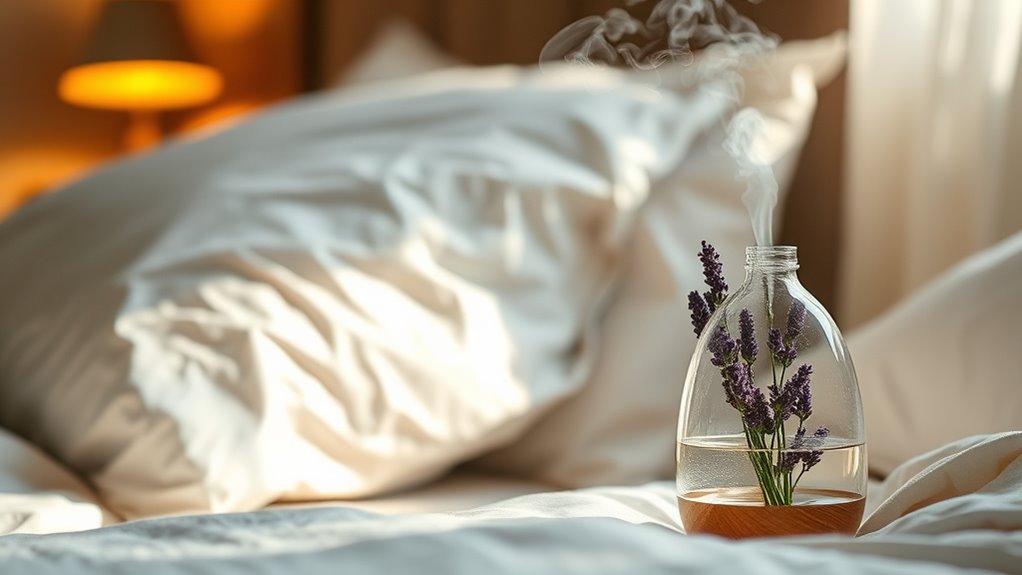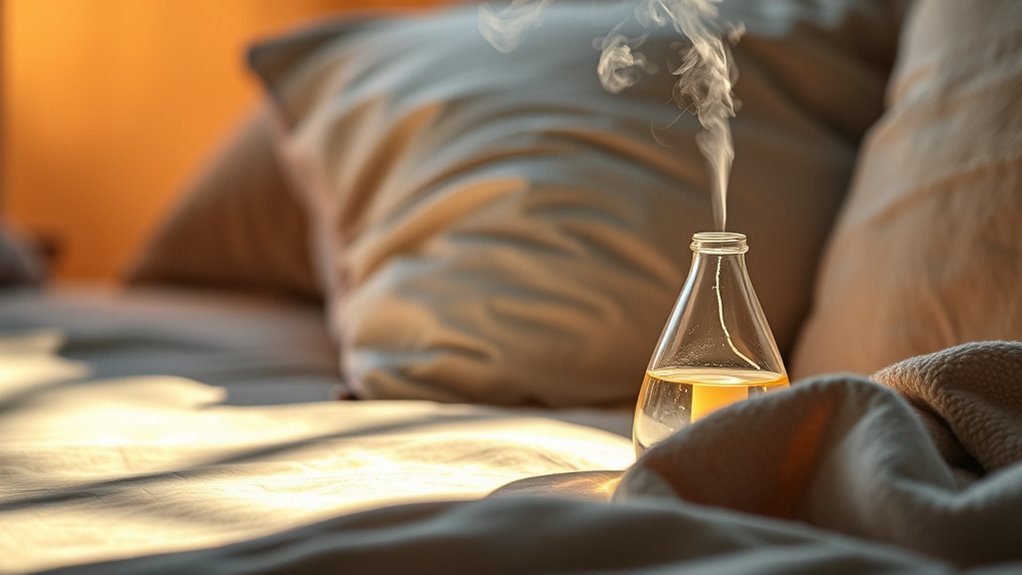To shorten your sleep latency with aromatherapy, try scents like lavender, chamomile, and ylang-ylang, which promote relaxation and signals your brain to unwind. Diffuse these calming aromas in your bedroom, add a few drops to a warm bath, or incorporate them into your pillow spray routine. Experiment with blends of lavender with cedarwood or frankincense to find what works best for you. Keep exploring ways to create a restful sleep environment that works naturally.
Key Takeaways
- Lavender is widely recognized for its ability to reduce sleep onset time and promote relaxation.
- Combining essential oils like chamomile and ylang-ylang can enhance calming effects and shorten sleep latency.
- Diffusing high-quality lavender or frankincense in the bedroom signals the brain to unwind.
- Incorporating essential oils into a consistent bedtime routine reinforces sleep cues and accelerates sleep onset.
- Using essential oils as pillow sprays or in baths creates a tranquil environment that helps transition to sleep faster.

If you struggle to fall asleep or stay asleep throughout the night, aromatherapy might offer a natural solution. One effective approach involves using essential oil blends designed to promote relaxation and reduce sleep latency. These blends can be customized to suit your preferences and create a calming sleep environment. When you incorporate the right essential oils into your nightly routine, you signal your brain that it’s time to unwind, making it easier to drift off quickly.
Creating a soothing sleep environment is vital. Your bedroom should be a sanctuary for rest, and incorporating essential oil blends into this space can enhance its calming effect. Diffusing essential oils like lavender, chamomile, or ylang-ylang in your room helps establish a tranquil atmosphere. These scents have been shown to decrease anxiety and lower heart rates, which are common barriers to falling asleep. By setting the right mood with a carefully curated sleep environment, you can considerably shorten your sleep latency.
Create a calming bedroom with essential oils like lavender and chamomile to reduce anxiety and promote faster sleep.
Using essential oils in your sleep environment isn’t just about diffusing them; you can also add a few drops to your pillowcase or mattress spray. This way, the scent remains close to your nose as you lie down, reinforcing relaxation. Some people find that incorporating essential oils into their bedtime routine—such as adding a few drops to a warm bath or mixing them into a carrier oil for massage—further enhances relaxation. The key is consistency; the more you associate these scents with bedtime, the stronger their effect becomes.
When selecting essential oil blends, look for those formulated specifically for sleep or relaxation. Combining lavender with cedarwood or frankincense can amplify the calming impact. Experiment with different combinations to discover which scents resonate most with you. Remember, the quality of your essential oils matters; choose pure, high-grade oils to avoid irritation and maximize benefits. Properly stored, these oils can be a long-lasting addition to your sleep routine.
Incorporating essential oil blends into your sleep environment is a simple, effective way to shorten sleep latency naturally. By consciously designing your space with calming scents, you send signals to your brain that it’s time to relax. Over time, these scents can become powerful sleep cues, helping you fall asleep faster and enjoy more restful nights. Additionally, using a high-quality air purifier in your bedroom can help remove airborne pollutants and allergens that may hinder sleep quality. With consistency and the right blends, you can improve your sleep quality without relying on medication or supplements.
Frequently Asked Questions
Can Aromatherapy Replace Prescribed Sleep Medications?
You might wonder if aromatherapy can replace prescribed sleep medications. While natural remedies like certain scents can improve sleep quality and reduce sleep latency, they aren’t a guaranteed substitute for medication, especially for serious conditions. The scent efficacy varies from person to person, and you should consult a healthcare professional before making changes. Aromatherapy can complement your sleep routine, but it’s best used alongside, not instead of, professional medical advice.
How Long Does It Take for Scents to Improve Sleep?
Did you know that some studies show aromatherapy can improve sleep quality within just 20 minutes? The scents duration and aromatherapy timing matter; most people notice effects within 15 to 30 minutes after inhalation. To optimize sleep, try diffusing calming scents like lavender or chamomile about half an hour before bed. Consistent use enhances benefits, helping you fall asleep faster and enjoy more restful sleep overall.
Are There Any Side Effects From Using Sleep Aromatherapy?
You might wonder if using sleep aromatherapy has side effects. While essential oils are generally safe, essential oil safety is important—you should always dilute oils properly. Some people may experience allergic reactions, like skin irritation or respiratory issues. To avoid problems, test a small amount first and consult with a healthcare professional if you have allergies or asthma. Using essential oils responsibly guarantees a safe, relaxing experience.
Can Aromatherapy Be Used Alongside Other Sleep Aids?
You can definitely use aromatherapy alongside other sleep aids, but it’s important to consider alternative relaxation techniques and essential oil safety. Always check for potential interactions or sensitivities, especially if you’re combining with medications or supplements. Ensure proper dilution and use high-quality oils. Consulting a healthcare professional helps you safely integrate aromatherapy into your sleep routine, enhancing relaxation without risking adverse effects.
Is Aromatherapy Effective for Chronic Insomnia?
You might wonder if aromatherapy truly helps with chronic insomnia. While some studies suggest it can improve sleep, you should consider the placebo effect and scent concentration. Your belief in its benefits could influence results, and too much scent may be counterproductive. Although aromatherapy isn’t a guaranteed cure, combining it with good sleep habits might offer some relief. Give it a try, but stay realistic about its limits.
Conclusion
By blending calming candles and comforting scents, you can create a peaceful path to sleep. Aromatherapy’s enticing aromas allure you into a quicker, quieter slumber, shortening your sleep latency. With consistent candlelight and mesmerizing clary sage, you’ll cultivate a cozy, calming climate conducive to restful rest. Remember, the right aromas aren’t just accessories—they’re allies in your nightly navigation toward natural, nourishing sleep. Embrace these aromatic allies and experience serene, swift slumber every single night.









